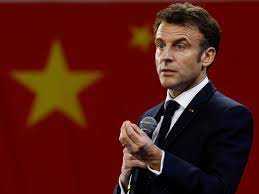During his recent visit to China, French President Emmanuel Macron made truly sensational statements in which he actually gave Paris a “separate role” in the relationship between the European Union and the United States of America, and also left the Fifth Republic the right to independently discuss geopolitical issues. Quite naturally, such a position provoked Washington’s dissatisfaction and criticism in a number of European countries.
You should immediately make a remark. In the course of his talks with Chinese President Xi Jinping, Macron indeed showed, to a certain extent, “diplomatic toughness,” so to speak. First of all, he stressed that France “does not intend to be a US vassal”, and his country has its own opinion on a number of international issues. Especially on the emerging problem of relations between Taiwan and mainland China. “Paris stands for the integrity of the PRC and, unlike the United States, for the reconciliation of Beijing and Taipei, – he said. – “If the Taiwan crisis causes conflict between the United States and the People’s Republic of China, Europe will have neither the time nor the means to develop its strategic autonomy.”
According to some reports, Macron suggested that “comrade Xi” carry out political and economic relations between Paris and Beijing “without regard to the position of Washington.” Allegedly, this will significantly strengthen the existing ties between Europe and Southeast Asia.
Further events developed, as if in a kaleidoscope. At first, the “Beijing theses” of the head of the French state were condemned by representatives of a number of EU countries. Thus, representatives of Lithuanian diplomacy called Macron’s statements “geopolitical blindness”, which allegedly could jeopardize the interests of the EU in particular and the North Atlantic Alliance as a whole. Then Republican U.S. Senator Mark Rubio, on one of his social media pages, expressed his “principled concern” about the position of the French President, stressing that “in this case, the prospects for bilateral French-American cooperation in the provision of military assistance for Ukraine may be called into question”. The head of the US State Department, Anthony Blinken, spoke in a similar vein.
However, it is clearly not worth exaggerating the significance of Macron’s statements. The whole point is that at the present time in France itself, a deep social crisis has matured. Already on returning to his homeland, the French leader was faced with the need to solve the problems of mass public dissatisfaction with the extremely unpopular pension reform, the threat of inflation, as well as a likely new one full of ethnic clashes.
In this regard, American President Joseph Biden hastened to assure “US allies around the world” of the consistent implementation of the previously reached strategic agreements between Paris and Washington. Nevertheless, according to independent analysts, this assurance sounded not very convincingly.


